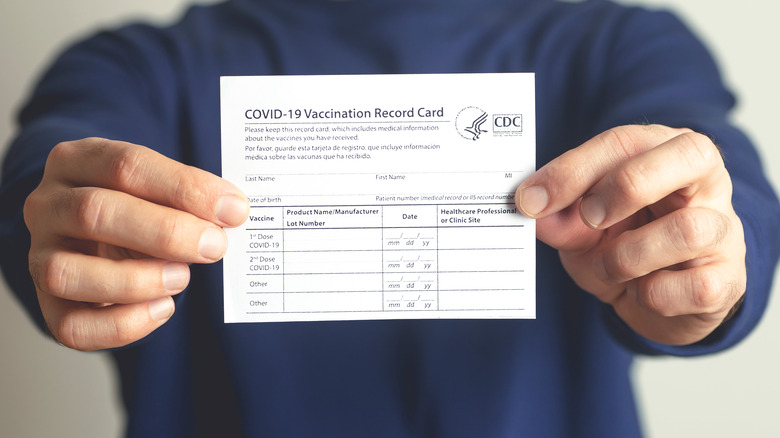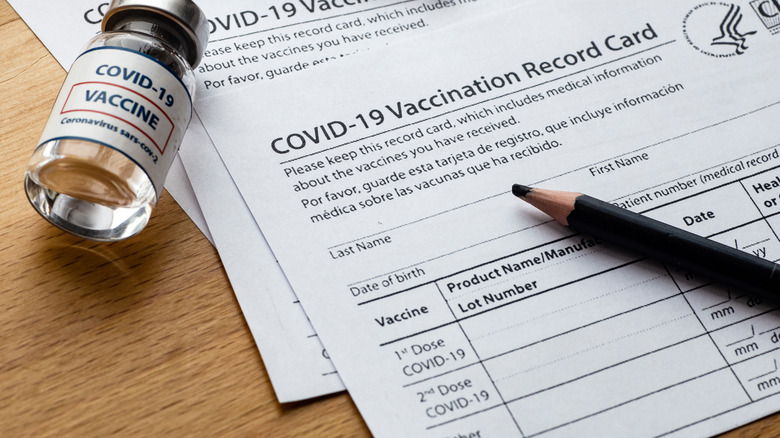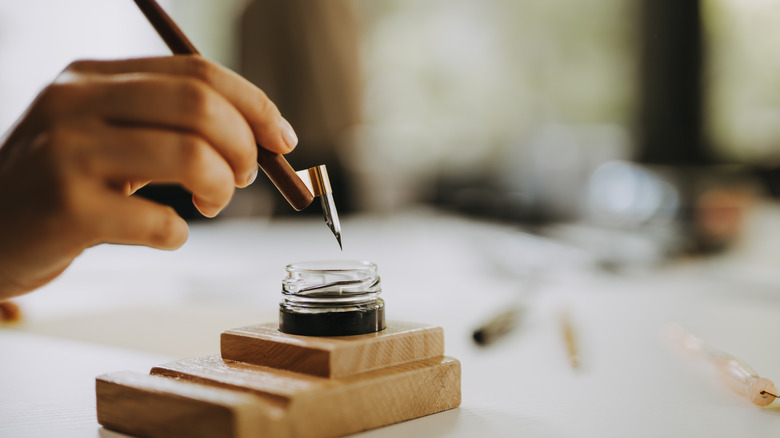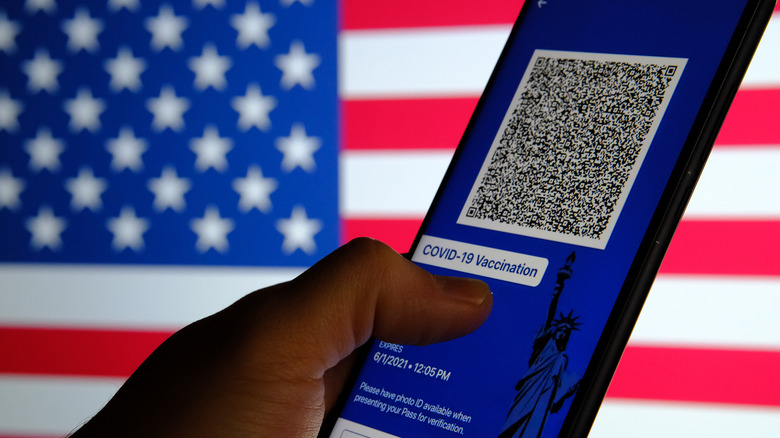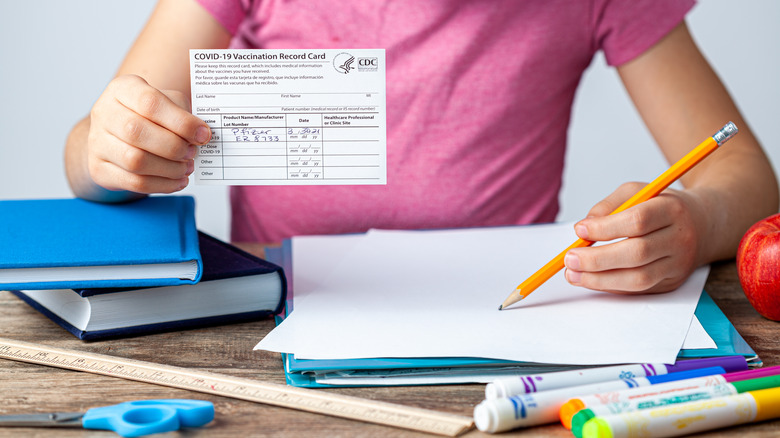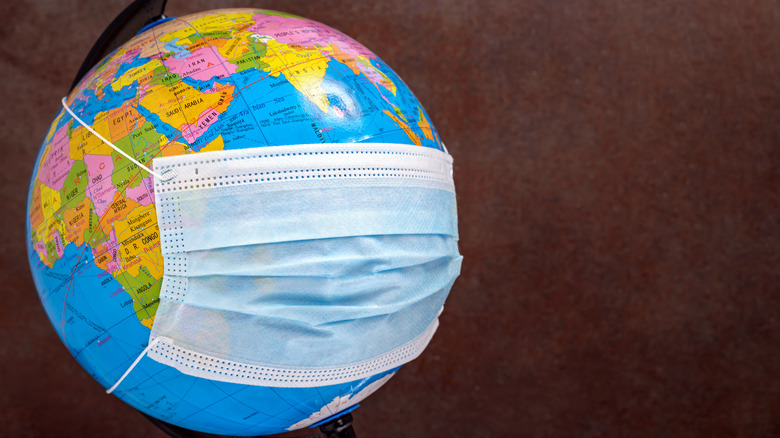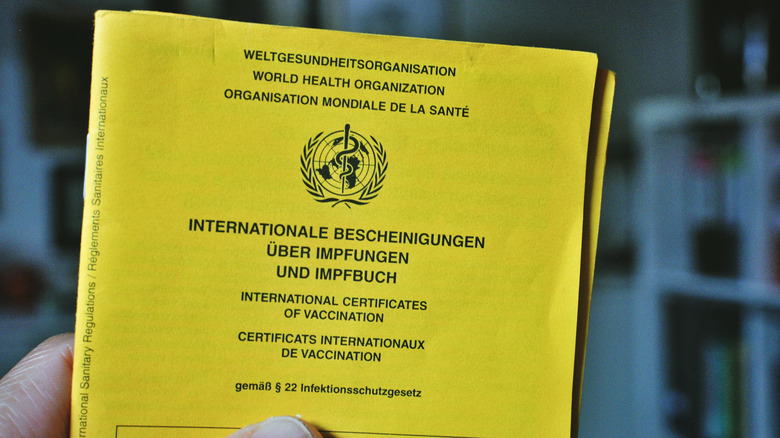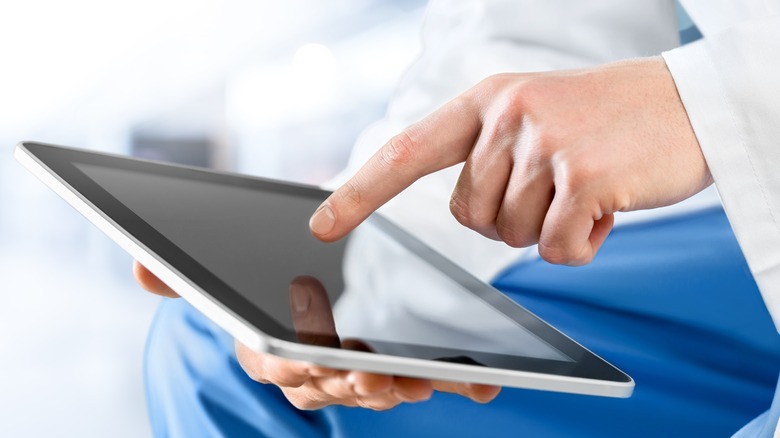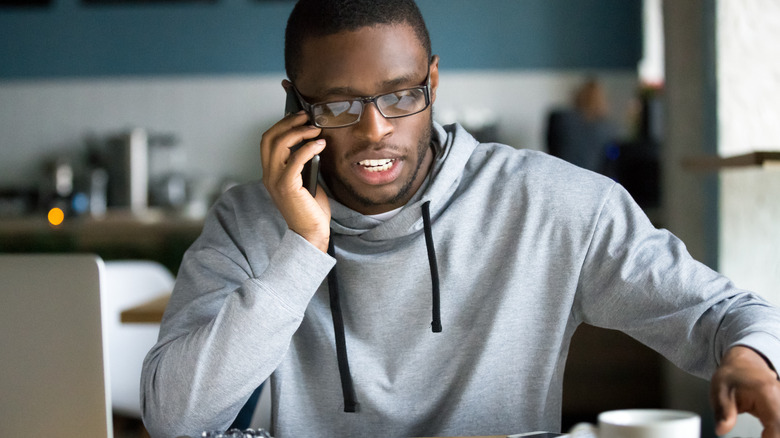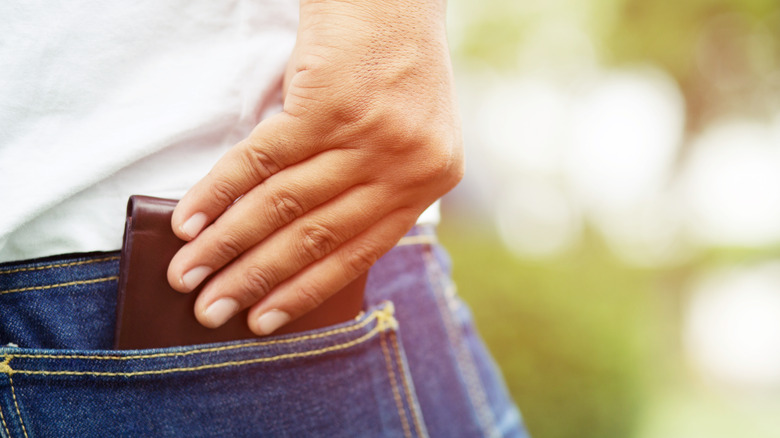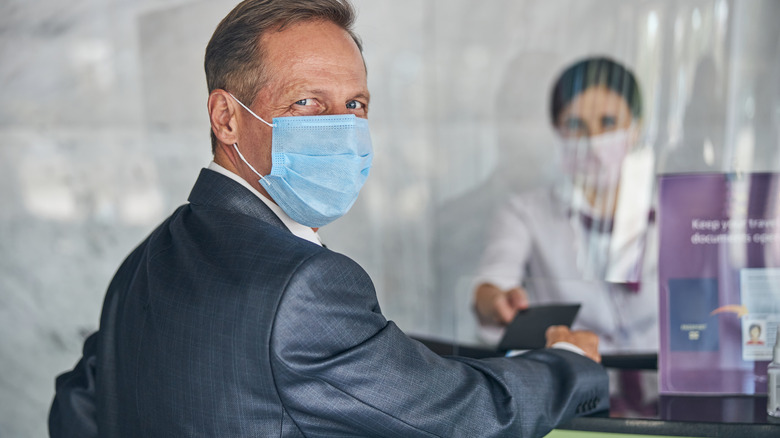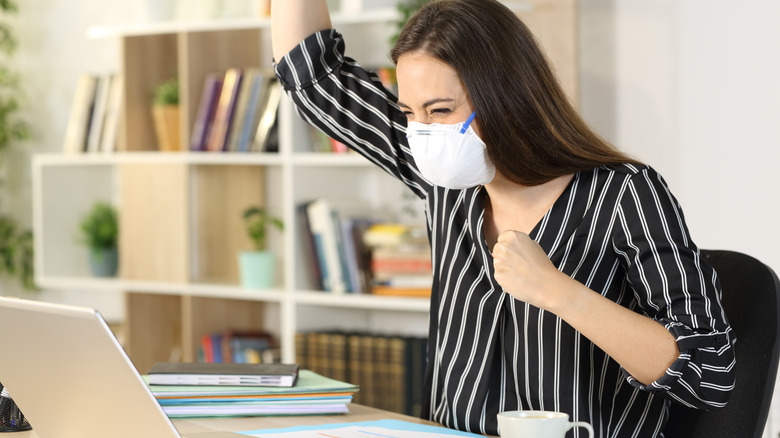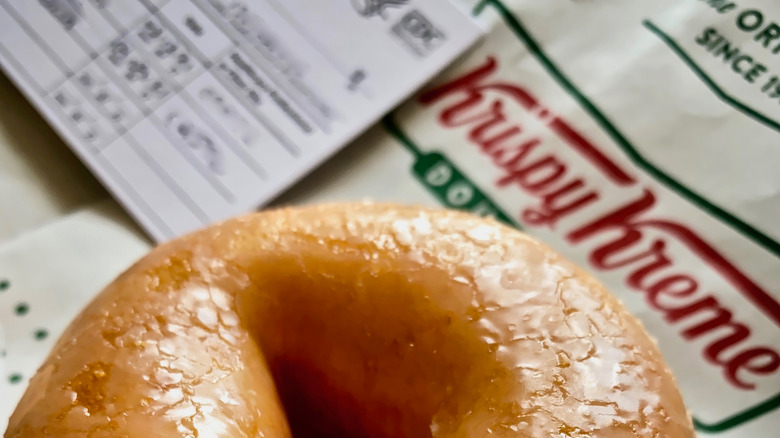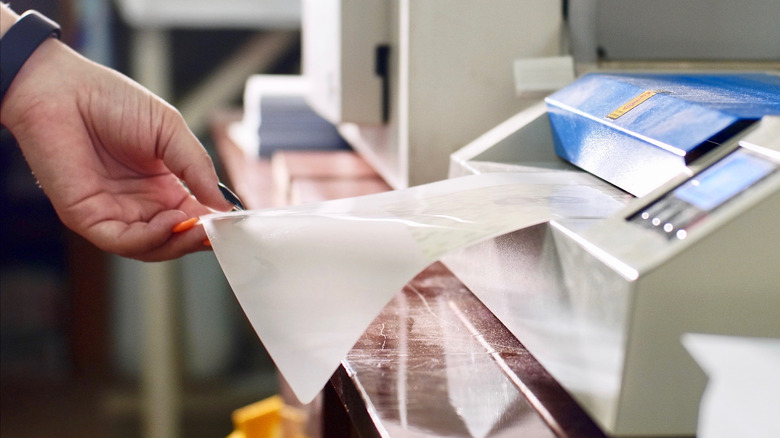Everything To Know About Your COVID-19 Vaccine Card Explained
As of April 19, 2021, nearly 40 percent of the American population has received at least one dose of the COVID-19 vaccine (via CDC). That means approximately 131.2 million people in this country are in possession of a COVID-19 vaccine card.
According to The Ohio State University Wexner Medical Center, one purpose of the COVID-19 vaccine card is to remind patients receiving the Pfizer and Moderna vaccines that they need a second dose. However, the card is also given to recipients of the one-dose Johnson & Johnson vaccine, and the CDC's current recommendation is to "keep your vaccination card in case you need it for future use."
So what might that "future use" refer to? With President Joe Biden having forecast that life in the U.S. could return to normal by Christmas, presumably if our country achieves vaccine-conferred herd immunity by then, many predict that what some are referring to as "vaccine credentials" or "vaccine passports" could become part of post-pandemic life (via ABC Eyewitness News). Is it true? And is your vaccine card really a "credential" of some sort? Read on as we explain everything you need to know about your COVID-19 vaccine card.
What information is on a COVID-19 vaccine card?
In addition to being a helpful reminder of when you will need to go back for a second dose of the Pfizer or the Moderna vaccine and a confirmation that you have completed your dose regimen, the COVID-19 vaccine card contains other important information (via The Ohio State University Wexner Medical Center). Your card is a record of which vaccine you received (i.e., which company manufactured it), at which vaccine center you were vaccinated, and the date(s) on which you received your dose(s), Alex Brown, a spokesperson for Walgreens, told The New York Times.
As of this writing, Walgreens and other clinics that offer the COVID-19 vaccine on behalf of the government are looking into making vaccination records available digitally. Nevertheless, the piece of paper you know as your "COVID-19 vaccine card" is very likely the most readily accessible record you have of your vaccination — similar to the way your paper receipt is your most readily accessible record of your having actually paid for the items in your shopping cart as you exit Costco.
Why would such an important record be left to paper?
In a world in which smartphones appear virtually ubiquitous and electronic health records are becoming increasingly not only commonplace but also preferred over paper medical charts, you may find it odd that a paper COVID-19 vaccine card is the chosen form of vaccination record-keeping. However, COVID-19 vaccine cards were never intended to be a credential indicating "proof of vaccination," according to Today. They were simply designed as reminder cards.
However, according to CBS News. "Tech companies, including IBM, Microsoft and Oracle, have been working on vaccine credentials" such that people will be able to quickly "flash" at public venues such as "ball games, concerts and airports for entry."
Previously, the Biden administration had expressed reluctance about involving itself in developing a system for confirming vaccination status (via ABC Eyewitness News). However, it has become apparent over time that such a system could very well be critical to our nation's economic and social recovery from the pandemic. Accordingly, the administration has since become involved in efforts to create a uniform digital vaccine verification system.
With vaccine verification coming, is a federal COVID-19 vaccine mandate also on the horizon?
The government has begun to involve itself, via multiple agencies, in the development and implementation of a uniform system to confirm the vaccination status of individuals that would eliminate the need for "vaccine cards" (via The Washington Post). That does not mean, however, that the government is moving in the direction of instituting a mandate with regard to COVID-19 vaccination.
To put it plainly: Supporting the rollout of a system to make it easier for private citizens to confirm their vaccination status does not equal a federal mandate that U.S. citizens receive COVID-19 vaccines, nor should it be construed as a step in that direction.
In fact, the White House has stated it has no intention of issuing any such federal mandate with regard to COVID-19 vaccination, Reuters reported in March 2021. Rather, according to White House Press Secretary Jen Psaki, verification of vaccinations is to be initiated and driven by the needs and desires of "the private sector" (via Reuters).
Vaccine cards are not new or unique to COVID-19
Since the government is allowing the development and implementation of a uniform system for verifying vaccination status among American citizens, some are questioning whether vaccine cards and their inevitable digital successors might represent a federally sponsored threat to individual liberties, Johns Hopkins School of Public Health (JHSPH) explained. The answer is no, according to attorney and JHSPH senior lecturer Joanne Rosen. Rosen clarified that the U.S. Supreme Court has long held that the U.S. Constitution permits state and local governments to enact vaccine mandates to safeguard the public health.
The case in which this was decided was 1905's Jacobson versus Massachusetts, which involved a 1902 outbreak of smallpox in Cambridge, Massachusetts that inspired Cambridge lawmakers to pass an ordinance requiring all adult residents to be vaccinated against smallpox or face a fine. The mandate was upheld, and long after smallpox's eradication, vaccine cards remain commonplace throughout the world — albeit not nearly as much in the U.S. — as noted by the authors of a 2019 paper published in Human Vaccines & Immunotherapeutics.
Countries across the globe are on board with COVID-19 vaccine cards and other credentials for travel
Even if the U.S. government were not moving in the direction of creating a digitized system to replace paper COVID-19 vaccine cards, other nations already appear to be doing so. "It's a tricky subject but governments are already looking at introducing systems that would enable authorities, and possibly businesses, to tell if a person has had a Covid vaccine or not," according to CNBC. For example, China's government has launched an app that is designed to indicate whether an individual is "symptom-free" before checking into a hotel or using the subway. In Chile, citizens who have recovered from COVID-19 have been issued with "virus-free" certificates.
It appears that Spain may go even further by creating a vaccine registry that will include not only those who have received the COVID-19 vaccine but also those who refused to do so for whatever reason. That registry could be made available to all European countries, according to the The Guardian.
Other countries may require you to present your COVID-19 vaccine card
Even if the U.S. were in no way involved in supporting the notion of "vaccine credentials" via COVID-19 vaccine cards or their soon-to-be digital successor, the fact remains that much of the rest of the world wants to know whether a U.S. citizen who wishes to cross their border has been vaccinated against COVID-19.
If you wish to travel internationally, you need to bear in mind that other countries may require you to prove you've been vaccinated. And the Centers for Disease Control and Prevention has no control over the vaccine requirements of other nations (via CDC).
This is not necessarily new. Before the vaccines became available, some countries were requiring travelers to present a negative COVID-19 test, according to the Council on Foreign Relations. As of early April 2021, some countries already use vaccine cards as a form of "passport" for travel within their country by foreign citizens. These include Cyprus, Greece, Belize, and Iceland, with other countries planning to follow suit. This is not unique to COVID-19, of course. You can find a complete list of the countries with yellow fever- and malaria-vaccine requirements on the CDC's website.
Is the COVID-19 vaccine card the only proof that you have been vaccinated?
Although your COVID-19 vaccine card may be the only document you may receive in connection with your vaccination, it is not the only documentation that can prove you have been vaccinated. Although the CDC recommends holding onto COVID-19 vaccine cards, and while the lamination debate rages on, the fact of the matter is that vaccine cards were never meant to be "proof" of vaccination (via Today). "There's nothing fancy about them," said Dr. Amesh Adalja, a senior scholar at the Johns Hopkins University Center for Health Security in Baltimore, told Today. "Think of them as almost like a souvenir ... it's just a piece of paper."
Although the U.S. has no centralized database with regard to immunizations, as of this writing, all COVID-19 vaccine providers are required to report all COVID-19 vaccinations to their state Immunization Information System (IIS), according to the CDC. While that information is not as easily accessible as your COVID-19 vaccine card, it exists nevertheless. In addition, enrolling in V-safe after your first vaccine dose allows you to access your vaccination information. However, the CDC says this program does not "serve as an official record of being vaccinated against COVID-19."
If you didn't get a COVID-19 vaccine card or lost the one you have, this is what you should do
Everyone is supposed to receive a COVID-19 vaccine card upon receipt of their first or only dose, and the CDC recommends that you hold onto it. However, if you didn't receive a vaccine card or if you have lost yours, there is no need to panic. While your card is an easily accessible source of information about the vaccine you received, it is not the only source of such information — nor is it your sole form of proof that you have been vaccinated against COVID-19 (via Today).
"If you did not receive a COVID-19 vaccination card at your first appointment, contact the vaccination provider site where you got your first shot or your state health department to find out how you can get a card," the CDC advises. "If you have lost your vaccination card or don't have a copy, contact your vaccination provider directly to access your vaccination record. If you cannot contact your vaccination provider directly, contact your state health department's immunization information system (IIS)."
Should you be carrying your COVID-19 vaccine card with you at all times?
"At this time, you do not need to carry your CDC vaccination card with you day to day," advised the The Ohio State University Wexner Medical Center in March 2021. "Other than bringing it to your vaccination appointments, you can keep it in a safe location." However, if you're going to travel out of the country, the medical center advises first confirming if the card is needed and if so, keep it safe and easily accessible by storing it on your person or in your carry-on.
All of that being said, you may find yourself in situations where having your COVID-19 vaccine card with you entitles you to certain benefits. According to CNBC, "Getting America vaccinated will go a long way toward helping the country return to some sort of normal," which is why "some businesses are doing their part to sweeten the pot." If any of your local businesses are partaking in giving out free or discounted things for vaccinated folks, you may want to consider bringing your vaccination record card.
Can employers legally require you to present your COVID-19 vaccine card in order to work?
It appears that U.S. employers will be allowed to require proof of COVID-19 vaccination from all employees (except those precluded from being vaccinated for religious or medical reasons), according to the National Law Review. In December 2020, the Equal Employment Opportunity Commission (EEOC) issued guidance to employers for mandating that their employees must prove they have been vaccinated against COVID-19 in order to work, including tips for avoiding conflicts with other applicable employment-related laws (e.g., Americans with Disabilities Act).
Legal experts like Georgetown Law professor and public health expert Lawrence Gostin agree that businesses can require proof of vaccination as a condition of working, and that it is "lawful and ethical" to do so (via CBS News). "Businesses have a legal and ethical obligation to provide a safe environment," said Gostin. "Requiring vaccinations is the best way to do that."
Whether your COVID-19 vaccine card will be deemed "proof of vaccination" has not yet been addressed, but presumably, it will constitute just one possible form of proof (via EEOC). That is, at least until others (like digital proof containing QR codes) become available.
Some employers are offering incentives for employees with a COVID-19 vaccine card
Even if your employer never ends up requiring its employees to present proof of COVID-19 vaccination, your employer may be offering perks and other incentives to employees who receive one of the FDA-authorized COVID-19 vaccines.
"Already, employers such as AT&T, Instacart, Target, Trader Joe's, Chobani, Petco, Darden Restaurants, McDonald's and Dollar General are among a growing list of companies giving workers time off and extra money to get vaccinated for Covid-19," according to CNBC. In addition, Kroger and Publix are among the retail businesses that are offering their employees store credit or gift cards after showing they're fully vaccinated.
It appears this may be important in getting more Americans vaccinated. According to a report by the Society for Human Resource Management, as many as a quarter of employed Americans have said they would "probably" or "definitely" not get vaccinated against COVID-19 unless they are offered a "cash bonus or stipend" (via CNBC).
You are entitled to perks at certain businesses if you have a COVID-19 vaccine card
As of this writing, your COVID-19 vaccine card may make you eligible to receive rewards from various retail businesses which are offering perks to those with proof of having received the COVID-19 vaccine (via CNBC).
For example, you can get a free doughnut every day for the rest of 2021 from Krispy Kreme Doughnuts by presenting your vaccine card. A Cleveland movie theater is offering free popcorn throughout the month of April to moviegoers who present their vaccine card at the concessions stand. And if you live near Walled Lake, Michigan, you can get a free pre-rolled joint from a local marijuana dispensary if you're over 21 and present proof of vaccination (it's their "way of saying thank you for helping to end this pandemic and getting us back to normal," the dispensary said).
Presenting your vaccine card at Nathan's Coney Island flagship restaurant will entitle you to a free hot dog, according to Today. And you can get $50 in free snacks and seasonings from e-commerce company Drop if you post a "vaccine selfie" with the hashtag "DropCovid" and tag @JoinDrop on Instagram.
Don't laminate your COVID-19 vaccine card just yet
Although your COVID-19 vaccine card is not an official "credential," it offers readily accessible information about the vaccine you received and may entitle you to various privileges. To safeguard yours, the CDC recommends either photocopying or taking a picture of it. However, you should think twice before posting a photo of your card on the internet, as doing so could increase your risk of identity theft (via CBS 46 News).
While Staples and Office Depot are offering free lamination for vaccine cardholders, this may be a perk you'll want to skip for now. While keeping your card safe is important, according to Niket Sonpal, a New York City internist on faculty at the Touro College of Medicine, it may be premature to actually seal your card in plastic at this point (via Martha Stewart). You may need booster shots in the future, and you'd ideally have your booster information on your original card.
Sharon Nachman, chief of the division of Pediatric Infectious Diseases at Stony Brook Children's Hospital in Long Island, New York, agreed with Sonpal, saying, "I suspect that we may need to get booster shots in the future and will need to record them on the same document." Instead of laminating your card, she recommends using a small plastic folder or pouch.
